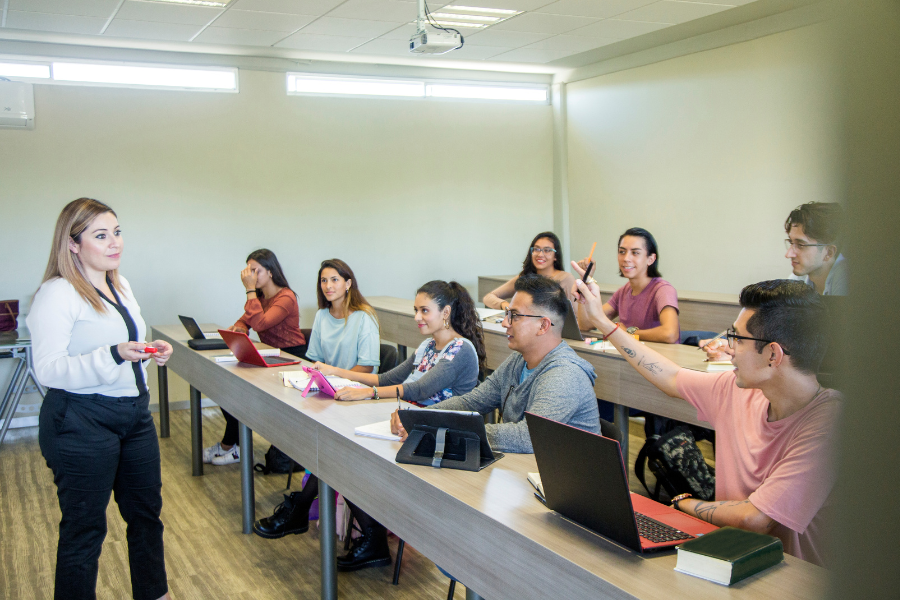In high school there are certain classes you have to take in order to graduate; generally quite a lot of them. You need however many years of English, math, history, and so on to give you the foundation of knowledge you need. Colleges do something similar with distribution requirements.
These are courses you need to take, credits you need to earn to graduate from college. How these work at colleges is very different from how they did in high school though, and each school has their own unique system. In this article we’re going to explain what distribution requirements are and how they work, and then give you a rundown of these requirements at top colleges. Let’s get started!
What are Distribution Requirements?
Distribution requirements are courses or credit you are required to take in order to gain a degree from a college. In general, colleges want you to have the following by the end of your four years:
- A certain number of major credits; certain required and extracurricular courses in your chosen area of study.
- A certain number of core classes; credits every student has to earn across selected subject areas.
- A number of elective credits to fill out your credit requirements.
The exact number of credits you need to earn varies by school, especially since schools often count credits differently. Also note that not all schools follow this model; while it is the most common way of doing things, many colleges have their own systems and traditions. We’ll cover individual colleges later.
You do have to pass the classes you take for distribution requirements, though you generally have some degree of freedom to choose your class. Generally school require to to take a class within a certain field or department, and you need to choose one that fits the bill. Thus even when you are taking required courses, you still have the opportunity to explore subjects of potential interest.
Why do Distribution Requirements Exist?
Top colleges in the US consider themselves liberal arts institutions, in the traditional sense of the word, and distribution requirements are a vestige of that tradition. The liberal arts of yore where things every true scholar was expected to know and have studied; the foundations for a classical education.
While the exact courses you are required to take have changed, the philosophy behind these requirements has not. These colleges see themselves as more than job training programs; they want to teach you how to think deeply and critically about the world around you, with a broad enough knowledge base to do so in multiple important fields.
They believe that scientists need to be able to appreciate the humanities and compose prose that flows fluidly, while scholars of the humanities should be conversant in math and science.
While schools do have different specific requirements, most liberal arts programs broadly have students do the following with their distribution requirements:
- Take a few humanities courses, in history or the arts.
- Take a few classes in the hard sciences, usually with a lab component.
- Demonstrate proficiency in at least one foreign language.
- Take a few classes in the social sciences.
- Demonstrate competency in math.
In some cases, AP credit will count towards these course requirements. In others, classes you take for distribution requirements can be counted towards your major, while at other schools they explicitly cannot. Generally though, this is what schools think you need to know as the baseline to count yourself a scholar, and distribution requirements are meant to get you there.
Distribution Requirements at Top 40 Colleges
Now that we’ve examined the general case, we’re going to look at the exact distribution requirements at top 40 colleges. We have organized this list alphabetically for convenience. Also, there are more than 40 schools on this list; this is because rankings change a bit every year, so we added a few additional schools on, to cover all our bases.
| University | Number of Required Courses | Distribution Requirements |
| Boston College | 15 | The number and sort of required courses depend on the school within Boston College, but all cover the bases of liberal arts. |
| Boston University | 10-12 | All BU students must complete the HUB. These courses often overlap with each other, and can be used to count towards your major requirements. |
| Brandeis | 5* | Brandeis’ core requirements mostly take the form of competencies which may be gained through almost any course you take. |
| Brown | 0 | Brown had no course requirements. You must complete a major, and demonstrate competency in writing, but there are no set courses you must take at all for Brown. |
| Caltech | 24 | Caltech requires all students take courses in math, humanities, and the sciences (social and physical). They specifically state these courses are hard on purpose to test your resolve. If you do not like math, this may not be a good option for you. |
| Carnegie Mellon | 10-15 | This varies greatly between the Colleges within CMU. See the engineering requirements compared to the humanities and social studies requirements as an example. |
| Case Western | 7* | Case Western’s general requirements cover seven courses, and then additional core competencies which must be fulfilled. |
| Columbia | 8 | Columbia’s core requires students take classes in science, humanities, foreign language, and physical education. |
| Cornell | 11-19 | Cornell has a different core curriculum requirement for each college within it. Arts and Sciences and Engineering are examples of how much these can differ. |
| Dartmouth | 19* | Dartmouth requires students pass three specific courses, and then take ten classes worth of distribution requirements. You can double count some courses here, so while ten are required, you may end up taking fewer with clever scheduling. |
| Duke | 19/18* | Duke Arts and Sciences requires 18 courses, but you may double count some of these with careful scheduling. Duke Engineering requires 19, without the possibility of cross listing courses. |
| Emory | 15 | Emory requires all students complete 15 courses, some of which are specific courses which all students must take, and others cover specific core competencies and allow for a range of course options. |
| Georgetown | 10* | Georgetown has two sets of core curricula. The first is common to all students and requires ten courses in total. Each undergraduate college then has their own additional core curriculum of required courses. Arts and Sciences: 5, Business 11 (plus additional required business courses for your major), Nursing 6, and Foreign Service 10 (though some may overlap with the university core). |
| Georgia Tech | 15* | All students must fulfill core requirements; the exact courses can in some cases be double counted, making the exact number you need to take variable. |
| Harvard | 12* | Harvard requires up to 12 courses for their core curriculum, but you can test out of the language requirements by proving proficiency. |
| Johns Hopkins | 0* | There is no core curriculum at Johns Hopkins, but you must take at least some classes outside the subject of your major. Arts and Sciences students are required to take two courses their freshman year. |
| MIT | 17 | MIT requires all students to take 17 courses in their core curriculum. In addition to this, all students must pass a swimming test. |
| New York University | 8* | The College of Arts and Sciences requires the core; other schools at NYU require some, but not all, of the same courses. |
| Northeastern | 11* | Northeastern has the PATH requirements. These are competencies, rather than strict course requirements, and so can be satisfied through multiple different courses. |
| Northwestern | 12* | All undergrads at Northwestern must complete distribution requirements, but what these are depends on the college you are in. Arts and Sciences has 12, Communications has 18, Engineering 27 (but that includes the core introductory classes to study engineering). |
| Notre Dame | 13 | All students at Notre Dame must satisfy the core requirements. Three of these must be taken in your first year, the rest may be taken at any point while at the school. |
| Princeton | 12/16 | Princeton has different core requirements for AB and BSE students. BSE students have additional courses required to prepare them for engineering, but have fewer core courses outside of that. |
| Rice | 12 | Rice requires all students to take classes in the humanities, the social sciences, and the applied sciences; with equal weight put on each branch. |
| Stanford | 15* | Stanford requires 15 courses, plus their language requirement. This may be satisfied through coursework or by otherwise demonstrating proficiency in a foreign language. |
| Tufts | 10 | Students must complete two courses in each of five distribution areas. |
| Tulane | 10 | Tulane requires ten courses, along with a number of competencies which must be demonstrated through these or other courses. |
| UC Berkeley | 3* | Berkeley has 3 universal requirements, in English proficiency and American Institutions; these may be satisfied by exam credit. Each college within Berkeley then has its own required courses. Business requires 7, Engineering 6, Letters & Science 7, and Natural Resources requires 2. |
| UC Irvine | 18* | All UC Irvine students must complete the general education requirements. Some of these may be counted twice, allowing you to take fewer than 18 courses. |
| UCLA | 5,8,10 | All UCLA students need to take courses in the humanities, social sciences, and applied sciences. How many courses in each are required for you depends on your program of study at UCLA. Either 5, 8, or 10 courses are required. |
| UC San Diego | 3* | UC San Diego only requires three courses of all students, but each college within the school has its own requirements. |
| UC Santa Barbara | 9-10 | UC Santa Barbara has General Education requirements, with the specific courses and competencies then set by each college within the school. |
| UNC Chapel Hill | 15 | All students must fulfill the general education requirements. Students earning a BA must fulfill the supplemental requirements as well, which requires an additional three courses, or a minor or second major. |
| UChicago | 15 | All UChicago students must take 15 courses, in the humanities, sciences, math, and social sciences. There is an additional foreign language requirement, but you may test out of this. |
| University of Florida | 21* | All students must complete the general education requirements to graduate. Some of these may be double counted, or use AP credit to satisfy the requirements. |
| University of Michigan | Yes | Each college has its own core education requirements. Some, like engineering, have differing requirements for separate majors within the college as well. |
| UPenn | 7/8/9 | Each undergraduate school at Penn has their own core curriculum and requirements. Arts & Sciences requires a lot, but has no limits on double counting courses. Wharton requires 7 courses in the arts and sciences. Nursing has 9 required general courses. Engineering requires 8, including an ethics course. |
| University of Rochester | 0 | There are no core requirements at Rochester. |
| USC | 10 | All students must complete 10 courses, regardless of school within USC. |
| UVA | 12-16 | Each college at UVA has their own requirements. Engineering and Arts and Sciences differ greatly, but both serve as a liberal arts foundation. |
| UT Austin | 14 | All students at UT Austin must take the core curriculum, which includes core competencies they must know. |
| Vanderbilt | 17* | Each college at Vanderbilt sets its own requirements. Arts & Sciences requires 17 courses; Engineering requires only six in an abridged version of the same core. |
| Wake Forest | 14 | All students must take core requirements; consisting of basic and divisional course requirements. |
| Washington University of St Louis | 16 | Different schools at WashU have different requirements. Arts & Sciences requires 16 courses, while Engineering has a mixture of course and proficiency requirements. |
| William & Mary | 8* | Students must take a freshman seminar, and must demonstrate proficiency in each of seven different subject areas. |
| Yale | 11 | All students at Yale have the same distribution requirements. Note that language requires a minimum of one course, but may require more to prove your proficiency. |
A Note on Language Requirements
Many schools require a foreign language as part of their distribution requirements, but almost all of these allow students to test or place out of it. This is because if you enter college already speaking multiple languages fluently, they don’t believe you need to spend the time learning another.
An AP Exam may or may not qualify you to get out of the language requirement. Some schools have their own proficiency exams in place of these. Generally, however, all you need to do is demonstrate a sufficient level of proficiency. If you are an international student with a first language other than English, you usually qualify for this automatically.
Final Thoughts
Each college has their own policies for distribution requirements, which makes talking about them generally difficult. Some universities allow you to count them towards your major; others explicitly prevent you from doing so. Some are flexible with what classes you can take; others have strict course requirements.
In general, engineering courses have more requirements, but this is due in part to the number of general prerequisite courses required for engineering. Some schools count these as distribution requirements, others as major requirements. Overall though, engineering requires a lot of course work.
We hope that this article has given you a solid introduction to what distribution requirements look like at various top schools. Depending on your own desires, these can impact your college list. If you are looking for more curricular freedom, Brown or Johns Hopkins may be a better fit for you than Caltech.
If you are looking for additional advice on building the perfect college list, or applying to any of the colleges on it, schedule a free consultation today to learn how we can help you. We have a long experience helping students apply to top colleges, and are always happy to hear from you.








